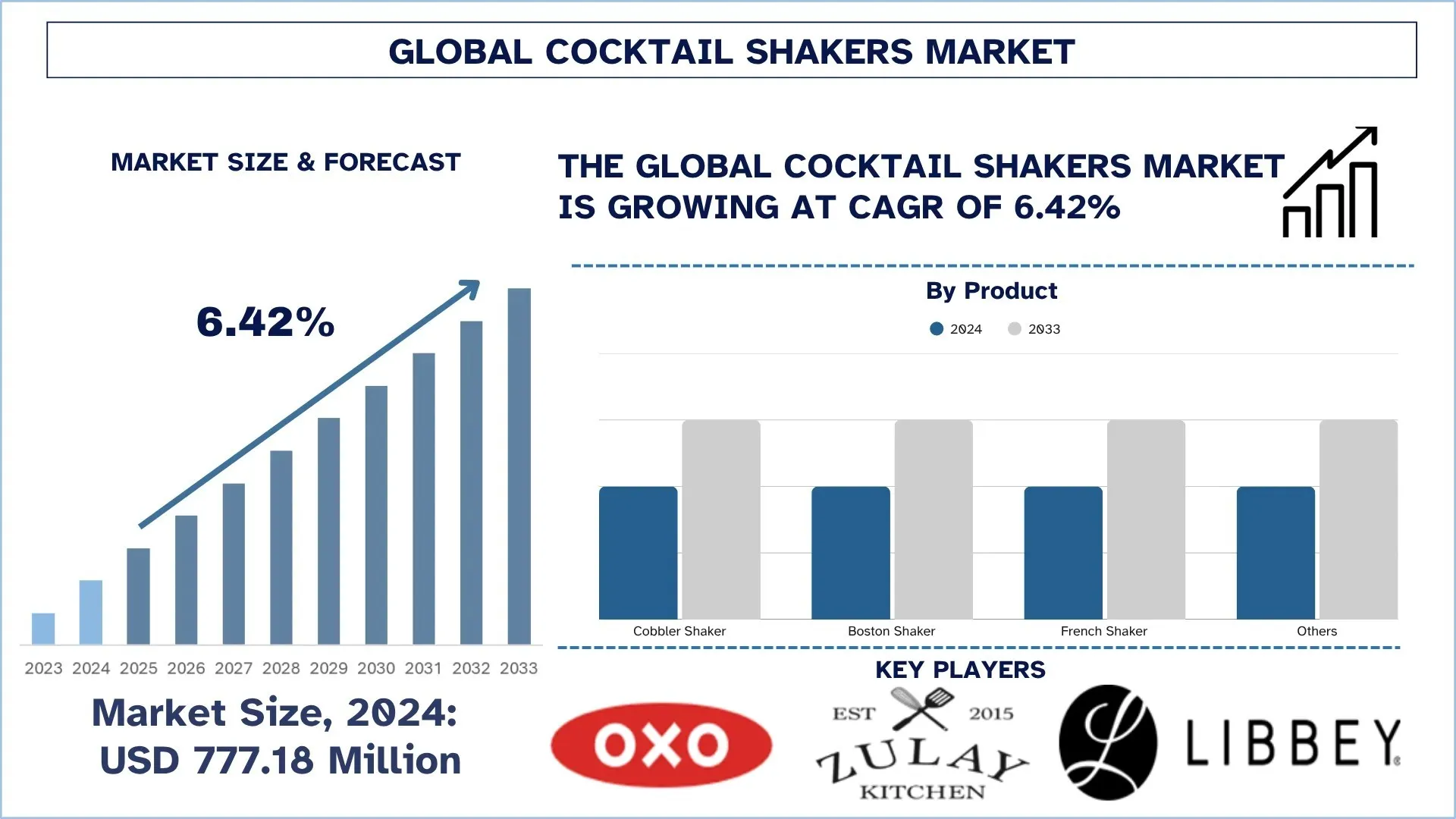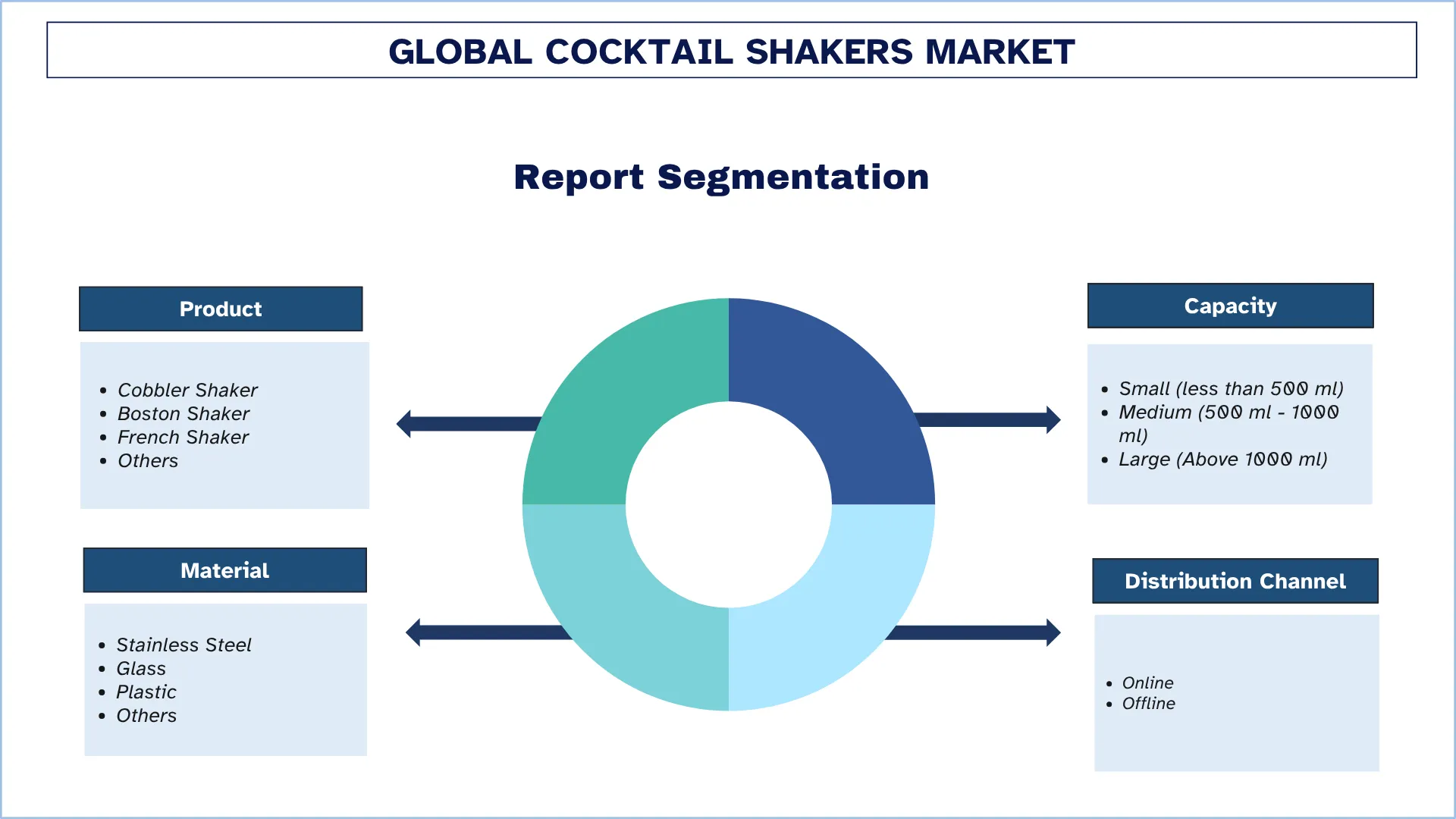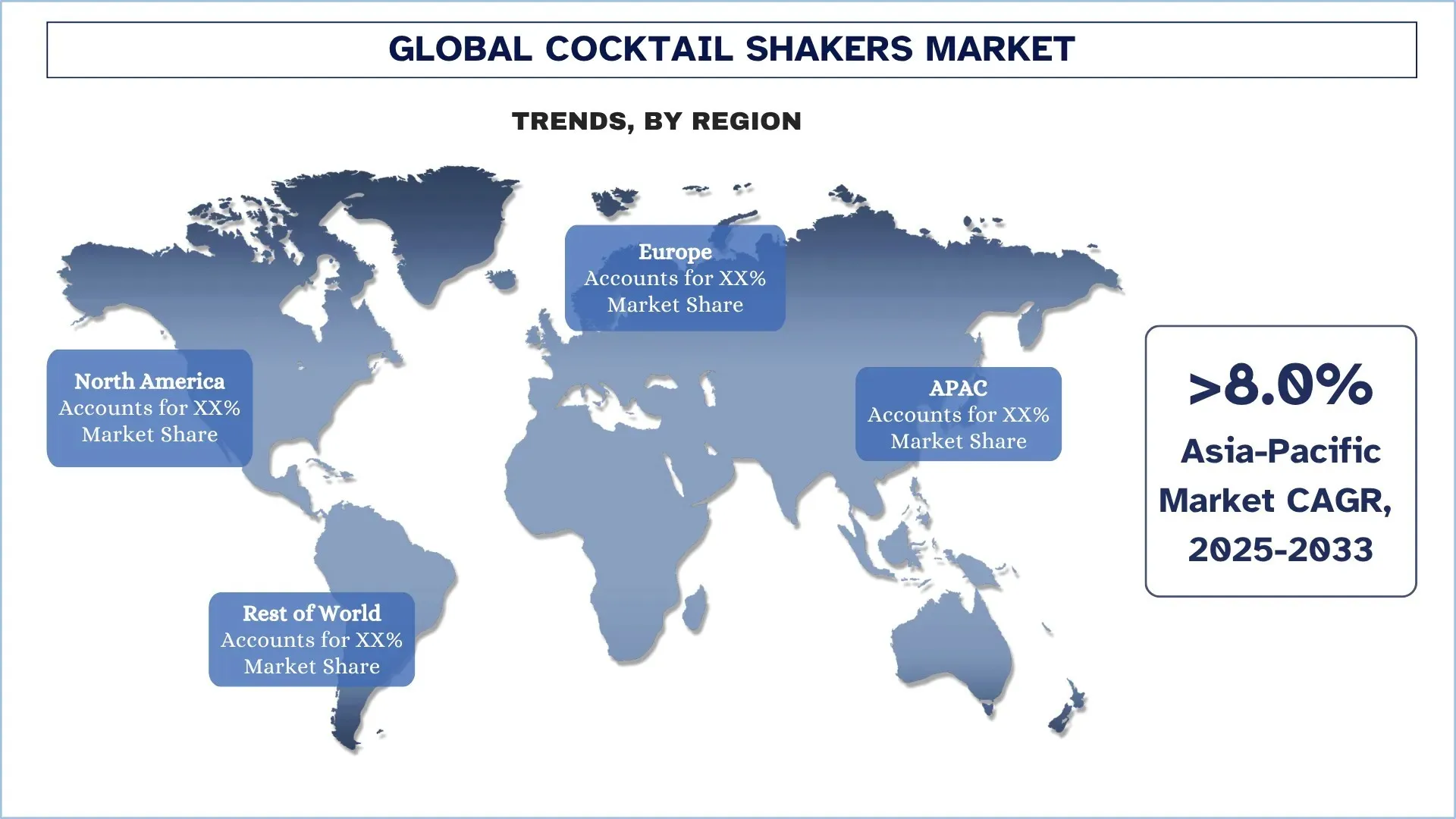- Home
- About Us
- Industry
- Services
- Reading
- Contact Us
Cocktail Shakers Market: Current Analysis and Forecast (2025-2033)
Emphasis on Product (Cobbler Shaker, Boston Shaker, French Shaker, and Others); Material (Stainless Steel, Glass, Plastic, and Others); Capacity (Small {less than 500 ml}, Medium {500 ml - 1000 ml}, and Large {Above 1000 ml}); Distribution Channel (Online and Offline); Application (Individual and Commercial); and Region/Country

Global Cocktail Shakers Market Size & Forecast
The Global Cocktail Shakers Market was valued at USD 777.18 million in 2024 and is expected to grow at a steady CAGR of around 6.42% during the forecast period (2025-2033F), driven by the growing cocktail culture, home bartending trends, product innovation, sustainability, hospitality sector expansion, premium gifting, and industry support.
Cocktail Shakers Market Analysis
The global cocktail shaker market is growing steadily due to increased consumer interest in home mixology, the rise in bar and restaurant culture, and the growing influence of social media on lifestyle and entertainment trends. Professional bartenders and home enthusiasts are increasingly purchasing high-quality barware, such as stainless steel and designer cocktail shakers, fueled by the growing popularity of craft cocktails and premium spirits. Additionally, growing at-home bartending trends, rapid urbanization, and the use of modern lifestyle products are boosting the demand for high-end and smart cocktail shakers. Furthermore, rising consumer preference for customized and accurate cocktail making, along with the integration of AI-based recipe guidance and interactive apps, further drives the market growth. Moreover, rising collaboration among barware brands, enhanced e-commerce initiatives, and marketing campaigns targeting younger, tech-savvy audiences are fueling the swift global adoption of smart cocktail shakers.
Global Cocktail Shakers Market Trends
This section discusses the key market trends that are influencing the various segments of the global cocktail shakers market, as found by our team of research experts.
Smart Technology Integration
Smart technology integration is a major trend in the cocktail shaker market, turning traditional barware into connected, tech-enabled tools that fulfill the growing demands of modern consumers. This trend aligns with the broader movement toward smart home and kitchen devices, where convenience, precision, and personalization are highly valued. The integration of advanced features in cocktail shakers, such as built-in timers, LED indicators, Bluetooth devices, and app-based recipe assistance, is changing the mixology experience. Such innovations allow users, especially beginners, to make bar-quality cocktails at home with professional precision. Furthermore, smart shakers integrated with digital measuring systems ensure precise ingredient proportions, while mobile apps provide guided instructions and track user preferences. Such technology not only improves user convenience but also promotes product differentiation in an increasingly competitive market. Additionally, the integration of IoT devices and AI-driven features offers customization and performs data analysis to generate insights, allowing brands to tailor user experiences. Companies are increasingly using this trend to target tech-savvy consumers and expand their product portfolios into the smart kitchenware segment. For example, in January 2024, Barsys introduced its new product, Coaster 2.0, a smart shaker system that connects to a mobile app via Bluetooth. The device uses interactive lighting to precisely provide the proportion of each ingredient.
Cocktail Shakers Industry Segmentation
This section provides an analysis of the key trends in each segment of the global cocktail shakers market report, along with forecasts at the global, regional, and country levels for 2025-2033.
The Cobbler Shaker Segment Dominates the Global Cocktail Shakers Market
Based on the product category, the market is categorized into Cobbler Shaker, Boston Shaker, French Shaker, and Others. Among these, the cobbler shaker dominates the market because of its easy-to-use design, affordability, and versatility, along with shifts in consumer lifestyles and rising interest in mixology. Unlike Boston or French shakers, it has a built-in strainer and cap, allowing users to shake and pour drinks without extra tools, which simplifies the cocktail-making process. However, the Boston shaker is showing the fastest growth due to its widespread use in professional bartending environments and its large mixing capacity. The rising global cocktail culture, expansion of the hospitality industry, and professional bartending training programs are further encouraging the use of these shakers in both commercial and premium home environments.
The Stainless-Steel Segment Dominates the Global Cocktail Shakers Market.
Based on the material category, the market is categorized into stainless steel, glass, plastic, and others. Among these, the stainless-steel segment holds the largest market share as it is favored by both professional bartenders and home users because of its durability, corrosion resistance, and high-quality appearance. Due to their temperature retention, which ensures effective chilling of cocktails during shaking, these shakers are preferred. However, the glass segment is showing the fastest growth due to rising demand for attractive and transparent designs among home consumers and premium barware brands. The rising sustainability movement and consumers' demand for eco-friendly, non-plastic materials are accelerating the shift toward glass products.

North America holds the largest market share in the global cocktail shakers market
North America dominates the global cocktail shaker market because of its mature mixology culture, high purchasing power, broad distribution channels, major barware manufacturers, and well-developed retail and hospitality sectors. The region's vibrant cocktail culture, supported by numerous bars, restaurants, and hotels, constantly fuels demand for professional cocktail shakers and propels market growth. Consumers in North America also display a strong interest in home bartending, influenced by social media, craft cocktail trends, and lifestyle content that encourages at-home mixology. This dual demand from both commercial and individual users strengthens its position in the market. The availability of high-quality, innovative products such as cobbler and Boston shakers meets the demand for durable and attractive items, driving the growth of the market. Furthermore, the region's strong distributive network, including both offline retail chains and online platforms, ensures the availability of cocktail shakers. The increasing adoption of e-commerce platforms offers direct-to-consumer sales and improves product launches for both mass-market and premium segments, thereby driving the growth of the market.
The U.S. held a Dominant share of the North America Cocktail Shakers Market in 2024
The United States holds the largest share of the North America cocktail shakers market due to its well-established cocktail culture, strong hospitality sector, and rising trend of home mixology. The country has a long-standing history of cocktail consumption, supported by a large base of bars, restaurants, and lounges that continually demand professional-grade barware. Furthermore, an increasing number of consumers experimenting with at-home bartending has led to higher sales of premium cocktail shaker sets. The increasing popularity of social media platforms, particularly with cocktail-making tutorials and mixology content, has encouraged consumers to purchase premium bar tools, thus broadening the market. The market growth is further accelerated by the presence of major barware brands such as Barsys, Viski, and OXO.

Cocktail Shakers Industry Competitive Landscape
The global Cocktail shakers market is competitive, with several global and international market players. The key players are adopting different growth strategies to enhance their market presence, such as partnerships, agreements, collaborations, geographical expansions, and mergers and acquisitions.
Top Cocktail Shakers Market Companies
Some of the major players in the market are OXO International, Ltd., Zulay Kitchen, Libbey, Viski, Cocktail Kingdom, True Brands, American Metalcraft, The Vollrath Company, LLC, Alessi SpA, and Epic Products (Planet One Products, Inc.).
Recent Developments in the Cocktail Shakers Market
In 2024, Viski, a renowned barware brand, expanded its product line to include smart cocktail shakers. These devices combine traditional craftsmanship with modern technology, offering features like precision pouring, integrated lighting cues, and app connectivity. Viski's entry into the smart barware market reflects the growing consumer demand for high-quality, tech-enhanced cocktail-making tools.
In 2024, Elevated Craft introduced its Hybrid Cocktail Shaker, combining the functionality of a traditional shaker with a built-in strainer and jigger. This design aims to streamline the cocktail-making process, offering both professionals and enthusiasts a more efficient tool.
Global Cocktail Shakers Market Report Coverage
Report Attribute | Details |
Base year | 2024 |
Forecast period | 2025-2033 |
Growth momentum | Accelerate at a CAGR of 6.42% |
Market size 2024 | USD 777.18 million |
Regional analysis | North America, Europe, APAC, Rest of the World |
Major contributing region | The North America region is expected to dominate the market during the forecast period. |
Key countries covered | U.S., Canada, Germany, U.K., Spain, Italy, France, China, Japan, and India. |
Companies profiled | OXO International, Ltd., Zulay Kitchen, Libbey, Viski, Cocktail Kingdom, True Brands, American Metalcraft, The Vollrath Company, LLC, Alessi SpA, and Epic Products (Planet One Products, Inc.) |
Report Scope | Market Trends, Drivers, and Restraints; Revenue Estimation and Forecast; Segmentation Analysis; Demand and Supply Side Analysis; Competitive Landscape; Company Profiling |
Segments Covered | By Product, By Material, By Capacity, By Distribution Channel, By Application, and By Region/Country |
Reasons to Buy the Cocktail Shakers Market Report:
The study includes market sizing and forecasting analysis confirmed by authenticated key industry experts.
The report briefly reviews overall industry performance at a glance.
The report covers an in-depth analysis of prominent industry peers, primarily focusing on key business financials, type portfolios, expansion strategies, and recent developments.
Detailed examination of drivers, restraints, key trends, and opportunities prevailing in the industry.
The study comprehensively covers the market across different segments.
Deep dive regional level analysis of the industry.
Customization Options:
The Global Cocktail Shakers Market can further be customized as per the requirements or any other market segment. Besides this, UnivDatos understands that you may have your own business needs; hence, feel free to contact us to get a report that completely suits your requirements.
Table of Content
Research Methodology for the Global Cocktail Shakers Market Analysis (2023-2033)
We analyzed the historical market, estimated the current market, and forecasted the future market of the global cocktail shakers market to assess its application in major regions worldwide. we conducted exhaustive secondary research to gather historical market data and estimate the current market size. To validate these insights, we carefully reviewed numerous findings and assumptions. Additionally, we conducted in-depth primary interviews with industry experts across the cocktail shaker value chain. After validating market figures through these interviews, we used both top-down and bottom-up approaches to forecast the overall market size. We then employed market breakdown and data triangulation methods to estimate and analyze the market size of industry segments and sub-segments.
Market Engineering
We employed the data triangulation technique to finalize the overall market estimation and derive precise statistical numbers for each segment and sub-segment of the global cocktail shakers market. we split the data into several segments and sub-segments by analyzing various parameters and trends, including product, material, capacity, distribution channel, application, and regions within the global Cocktail shakers market.
The Main Objective of the Global Cocktail Shakers Market Study
The study identifies current and future trends in the global cocktail shakers market, providing strategic insights for investors. It highlights regional market attractiveness, enabling industry participants to tap into untapped markets and gain a first-mover advantage. Other quantitative goals of the studies include:
Market Size Analysis: Assess the current and forecast market size of the global cocktail shakers market and its segments in terms of value (USD).
Cocktail Shakers Market Segmentation: Segments in the study include areas of product, material, capacity, distribution channel, application, and region.
Regulatory Framework & Value Chain Analysis: Examine the regulatory framework, value chain, customer behavior, and competitive landscape of the cocktail shakers industry.
Regional Analysis: Conduct a detailed regional analysis for key areas such as Asia Pacific, Europe, North America, and the Rest of the World.
Company Profiles & Growth Strategies: Company profiles of the cocktail shakers market and the growth strategies adopted by the market players to sustain the fast-growing market.
Frequently Asked Questions FAQs
Q1: What is the global cocktail shaker market’s current market size and growth potential?
As of 2024, the global cocktail shakers market is valued at USD 777.18 million and is projected to grow at an impressive CAGR of 6.42% from 2025 to 2033, driven by rising home bartending, smart barware adoption, and premium cocktail culture trends.
Q2: Which segment has the largest share of the global cocktail shakers market by product category?
The cobbler shaker segment holds the largest share of the global cocktail shakers market due to its ease of use, classic design, and popularity among both professional bartenders and home mixologists.
Q3: What are the driving factors for the growth of the global cocktail shakers market?
Top growth drivers of the Cocktail shakers market include:
• Rising At-Home Bartending Trend: More consumers are setting up home bars and experimenting with cocktails.
• Innovation in Product Design: Smart, ergonomic, and premium cocktail shakers are attracting buyers.
• Growing Alcohol Consumption: Increasing demand for cocktails in bars, restaurants, and homes fuels market expansion.
Q4: What are the emerging technologies and trends in the global cocktail shakers market?
Emerging trends in the cocktail shakers market include:
• Smart Technology Integration: IoT-enabled and app-connected shakers for precise cocktail making.
• Increased Demand for Premium Products: High-quality materials, sleek designs, and advanced features are gaining popularity.
Q5: What are the key challenges in the global cocktail shakers market?
Key challenges in the cocktail shaker market include:
• Fluctuating Raw Material Prices: Increases in stainless steel and other material costs impact production.
• Prevalence of Imitation Products: Low-quality counterfeit products affect brand trust and market growth.
Q6: Which region dominates the global cocktail shaker market?
North America dominates the global cocktail shakers market due to a strong home bartending culture, high disposable incomes, and widespread adoption of smart and premium barware products.
Q7: Who are the key competitors in the global cocktail shakers market?
Top players in the Cocktail shaker industry include:
• OXO International, Ltd.
• Zulay Kitchen
• Libbey
• Viski
• Cocktail Kingdom
• True Brands
• American Metalcraft
• The Vollrath Company, LLC
• Alessi SpA
• Epic Products (Planet One Products, Inc.)
Q8: What are the recent merger & acquisition (M&A) and investment activities shaping the global cocktail shakers market?
The cocktail shakers market has seen rising strategic collaborations, investments, and acquisitions aimed at expanding product portfolios and market reach. Key companies are acquiring niche barware brands or forming partnerships with hospitality and e-commerce platforms to strengthen distribution, enhance design innovation, and cater to growing consumer demand for premium and sustainable cocktail tools.
Q9: How are sustainability and material innovation influencing the cocktail shaker market?
Sustainability has become a key focus in the cocktail shaker industry, with leading brands adopting eco-friendly, recyclable materials such as stainless steel, bamboo, and glass. Manufacturers are also investing in responsible sourcing, waste reduction, and sustainable packaging to align with global environmental standards and consumer preferences for green products.
Related Reports
Customers who bought this item also bought










